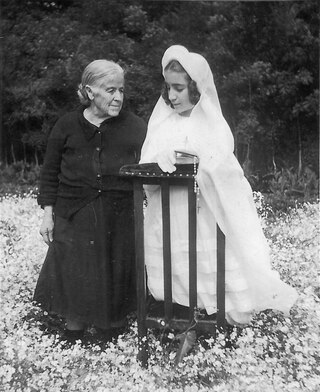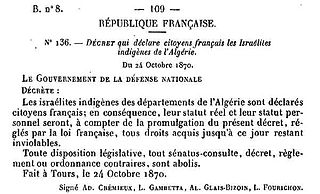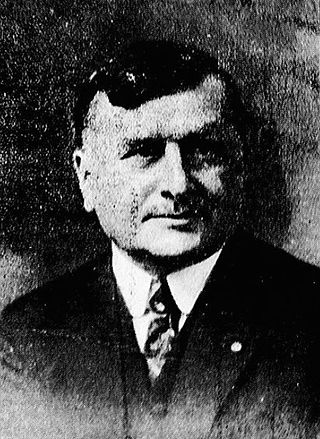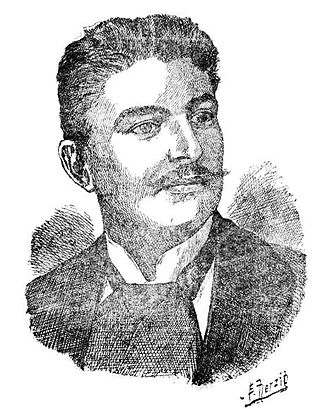Related Research Articles
Antisemitism is hostility to, prejudice towards, or discrimination against Jews. This sentiment is a form of racism, and a person who harbours it is called an antisemite. Though antisemitism is overwhelmingly perpetrated by non-Jews, it may occasionally be perpetrated by Jews in a phenomenon known as auto-antisemitism. Primarily, antisemitic tendencies may be motivated by negative sentiment towards Jews as a people or by negative sentiment towards Jews with regard to Judaism. In the former case, usually presented as racial antisemitism, a person's hostility is driven by the belief that Jews constitute a distinct race with inherent traits or characteristics that are repulsive or inferior to the preferred traits or characteristics within that person's society. In the latter case, known as religious antisemitism, a person's hostility is driven by their religion's perception of Jews and Judaism, typically encompassing doctrines of supersession that expect or demand Jews to turn away from Judaism and submit to the religion presenting itself as Judaism's successor faith—this is a common theme within the other Abrahamic religions. The development of racial and religious antisemitism has historically been encouraged by anti-Judaism, though the concept itself is distinct from antisemitism.

French Algeria, also known as Colonial Algeria, was the period of Algerian history when the country was a colony and later an integral part of France.

The pieds-noirs are people of French and other European descent who were born in Algeria during the period of French rule from 1830 to 1962. Many of them departed for mainland France during and after the war by which Algeria gained its independence in 1962.

Constantine, also spelled Qacentina or Kasantina, is the capital of Constantine Province in northeastern Algeria. During Roman times it was called Cirta and was renamed "Constantina" in honour of Emperor Constantine the Great. Located somewhat inland, Constantine is about 80 kilometres from the Mediterranean coast, on the banks of the Rhumel River.

Maghrebi Jews or North African Jews are ethnic Jews who had traditionally lived in the Maghreb region of North Africa under Arab rule during the Middle Ages. Established Jewish communities had existed in North Africa long before the arrival of Sephardi Jews, expelled from Portugal and Spain. Due to proximity, the term 'Maghrebi Jews' sometimes refers to Egyptian Jews as well, even though there are important cultural differences between the history of Egyptian and Maghrebi Jews. These Jews originating from North Africa constitute the second largest Jewish diaspora group.

The history of Jews in Algeria goes back to Antiquity, although it is not possible to trace with any certainty the time and circumstances of the arrival of the first Jews in what is now Algeria. In any case, several waves of immigration helped to increase the population. There may have been Jews in Carthage and present-day Algeria before the Roman conquest, but the development of Jewish communities is linked to the Roman presence. Jewish revolts in Israel and Cyrenaica in the 1st and 2nd centuries certainly led to the arrival of Jewish immigrants from these regions. Jewish proselytizing among the Berbers is an established historical fact, but its importance remains debated.

Mouloudia Club Oranais, known as Mouloudia d'Oran, commonly referred to as MC Oran for short, is a football club based in Oran, Algeria. Founded on 1 January 1917 and formed again on 14 May 1946, the club was known as Mouloudia Chaâbia Ouahrania from 1971 to 1977, Mouloudia Pétroliers d'Oran from 1977 to 1987 and Mouloudia d'Oran from 1987 to 1989. The club colours are red and white. Their home stadium, Ahmed Zabana Stadium, has a capacity of 40,000 spectators. The club is currently playing in the Algerian Ligue Professionnelle 1.

The Crémieux Decree was a law that granted French citizenship to the majority of the Jewish population in French Algeria, signed by the Government of National Defense on 24 October 1870 during the Franco-Prussian War. It was named after French-Jewish lawyer and Minister of Justice Adolphe Crémieux.

The Croix-de-Feu was a nationalist French league of the Interwar period, led by Colonel François de la Rocque (1885–1946). After it was dissolved, as were all other leagues during the Popular Front period (1936–38), La Rocque established the Parti social français (PSF) to replace it.
Antisemitism in France has become heightened since the late 20th century and into the 21st century. In the early 21st century, most Jews in France, like most Muslims in France, are of North African origin. France has the largest population of Jews in the diaspora after the United States—an estimated 500,000–600,000 persons. Paris has the highest population, followed by Marseilles, which has 70,000 Jews. Expressions of antisemitism were seen to rise during the Six-Day War of 1967 and the French anti-Zionist campaign of the 1970s and 1980s. Following the electoral successes achieved by the extreme right-wing National Front and an increasing denial of the Holocaust among some persons in the 1990s, surveys showed an increase in stereotypical antisemitic beliefs among the general French population.

Jules Molle was a Fascist French Algerian politician. He was the founder of the Unions latines political party, the mayor of Oran and the publisher of an Anti-Jewish newspaper, Le Petit Oranais, which ran for years with a swastika on its front and openly called for violence and persecution against Algerian Jews. His victory in the 1921 mayoral election was followed by street violence against Jews. After he was arrested in the year 1925 on charges of incitement to violence, pro-Molle rioters attacked and pillaged the Jewish quarter in Oran. By the time army forces had quelled the violence, two Jews had been killed and fifty wounded. Molle died from a heart failure in 1931.

Max Régis was a French journalist and politician who promoted anti-semitism in French Algeria during the late 1890s. He was elected mayor of Algiers in 1898 but was soon dismissed from office. He campaigned unsuccessfully for election as a national deputy in 1901 as an antisemitic candidate. He lived the rest of his life in obscurity.

The Géo Gras Group was a French resistance movement that played a decisive role during Operation Torch, the British-American invasion of French North Africa during World War II.

The 1934 Constantine riots erupted in the Algerian city of Constantine against the local Jewish population, rooted in the different manner in which Jews and Muslims had been treated in Algeria by the French colonial government. It is uncertain what the exact cause of the riots was, though various accounts suggest that the riots were triggered by an altercation between a Jewish man and some Muslims at the Sidi Lakhdar Mosque in Constantine. Multiple sources report that 25 Jews and 3 Muslims died over the course of the three-day riot, and several Jewish establishments were pillaged. The events have also been described as a pogrom.
This timeline of antisemitism chronicles the acts of antisemitism, hostile actions or discrimination against Jews as a religious or ethnic group, in the 19th century. It includes events in the history of antisemitic thought, actions taken to combat or relieve the effects of antisemitism, and events that affected the prevalence of antisemitism in later years. The history of antisemitism can be traced from ancient times to the present day.
Unions latines (UL) was an early 20th century fascist Algerian political party.
Le Républicain de Constantine was an anti-Jewish newspaper published by Émile Morinaud in 19th century French Algeria. Morinaud and his supporters in the Radical Party used anti-Semitic propaganda to curry support against the conservative Opportunist Republicans who held the majority at that time. Their main campaign promise was to make the Jews "bite the dust". Le Républicain de Constantine became their publication against the rival Opportunist newspaper L'Indépendant. The Jewish Algerian lawyer Elie Narboni accused Constantine's anti-Semitic newspapers of spreading false accusations that Jews had murdered children and baked cakes with their blood.
Elie Narboni was an Algerian Jewish attorney and President of the Consistoire Israélite de Constantine. He was an ally of the Constantine mayor Émile Morinaud. Their relationship began in 1908 and continued during the 1920s even as anti-Semitic political parties made headway in municipal politics.

Antisemitism in France is the expression through words or actions of an ideology of hatred of Jews on French soil.
References
- ↑ Cole, Joshua (2019). Lethal provocation: The Constantine Murders and the Politics of French Algeria. Cornell University Press. p. 74.
- ↑ Roberts, Sophie B. (2017). Citizenship and Antisemitism in French Colonial Algeria, 1870-1962. Cambridge University Press. p. 133.
- ↑ Roberts, Sophie B. (2017). Citizenship and Antisemitism in French Colonial Algeria, 1870-1962. Cambridge University Press. p. 135.